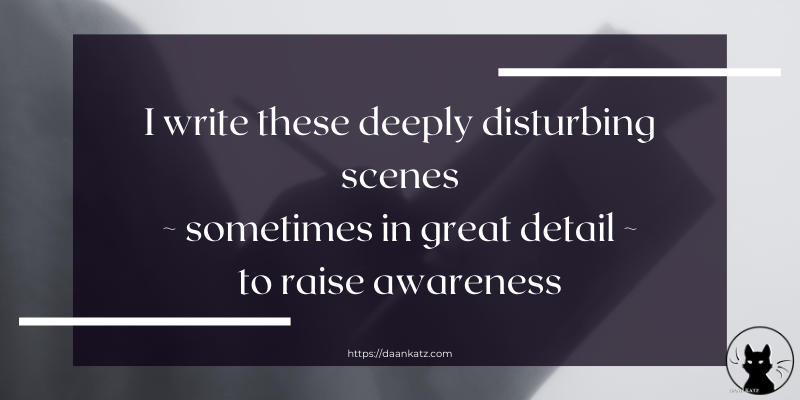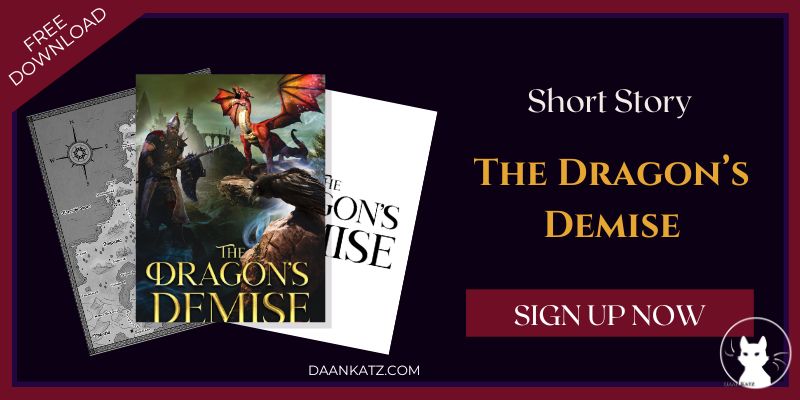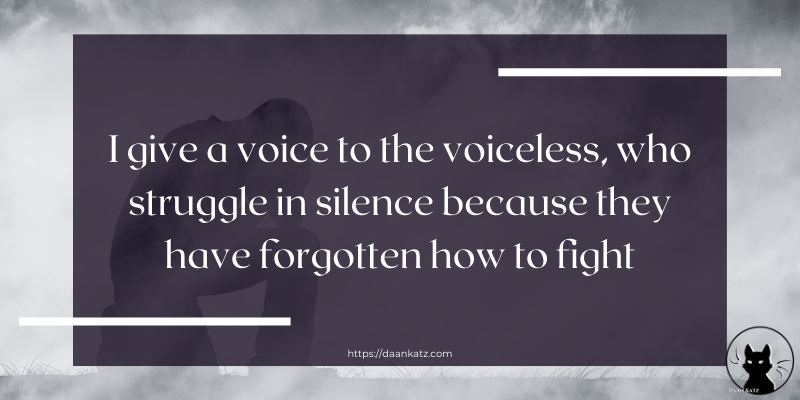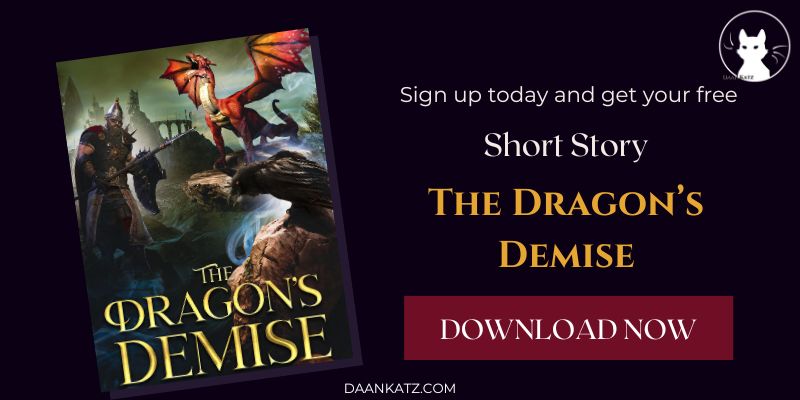What ‘s the deal with brutal honesty, courage, and trigger warnings for books? Can you be too honest? And do we really need trigger warnings? These are questions authors like me have to consider. At what point turns brutal honesty into cruelty? Where does courage end and stupidy begin? And what’s the benefit of trigger warnings?
My motto, which I brazenly stole from Ernest Hemingway, is: “Write hard and clear about what hurts.”
It fits me. I don’t shy away from the hard stuff, and I don’t shy away from being graphic either.
Someone said about my writing that it’s brutally honest. Someone else said about one of my most violent scenes in Night’s Reign that it was worse than a George Martin scene. And, while I’m not entirely sure I agree with that statement, I take it as a compliment.
Table of Contents
The Controversy of Dark Writing
I write Dark Fantasy for a reason. In a way, we could say that I did not choose Dark Fantasy as my genre, but Dark Fantasy chose me.
My stories are not just entertainment, although, of course, they absolutely do need to entertain my audience. But first and foremost, my stories are meant to help my readers make sense of the senseless. As such, they explore deep and profound themes. And they do so with brutal honesty.
Unfortunately, this has led some readers to view my most brutal scenes as “evil” or “gratuitous”. Without wishing to dismiss these readers—they absolutely have the right to their opinion—I will say that, to me, this indicates they have not grasped the underlying purpose of these scenes. Maybe they had different expectations. Maybe they read to forget about the misery of real life; and who could blame them for that?
Be that as it may, I can assure you I never write these scenes just for shock value. No violence or abuse just for darkness’s sake. Not in my books. That’s not who I am. My writing is driven by compassion and by empathy so deep, it actually hurts—both physically and emotionally.

I write these deeply disturbing scenes—sometimes in great detail—to raise awareness. As a disabled person, there isn’t much I can do to change the world, but as a writer, this is something I can do: I can confront my readers with the grim realities of the real world and show them how these experiences impact innocent people, often scarring them for life.
Some people like to look away and focus on the joys and blessings in life. I don’t look away, because I can’t.
Trigger Warnings for Books: Yes or no?
Does everyone who writes about war, death, abuse, etc. need to give trigger warnings?
On the one hand, trigger warnings exist for a reason. They inform vulnerable readers in advance about the inclusion of unfiltered and complex themes. This can help them decide whether or not to read the book.
On the other hand, trigger warnings for books can be seen as spoilers, and who wants a good, impactful story spoilt? Not me, thank you very much.
Unfortunately, there is no cut and dry answer to this question, and ultimately, each author who deals with heavy topics in their stories will have to weigh the pros and cons against each other carefully and then make a conscientious decision. I firmly believe that no other person can make this decision for them.
I deliberated long over this dilemma, and ultimately decided that the mental health of my potential readers is more important than the spoiler-effect a trigger warning might have. So, for better or worse, my books come with trigger warnings.
Want to see for yourself how I deal with heavy topics in my writing? If you sign up for my newsletter, I will send you a free short story as a welcome present.

Brutal Honesty and Courage
While my disability is definitely a part of who I am as a writer, that’s not the only thing that sets me apart. In fact, it may not even be the main thing that makes me different from other writers. Nope. It’s something else. It’s my stubbornness. Or even—dare I say it? Courage.
You see, I talk hard and clear about what hurts. I don’t believe in tiptoeing around sensitive subjects. Fine words butter no parsnips. I believe in being honest. Brutally honest. I believe in storming the walls of silence and breaking the stigmas that surround so many kinds of suffering.
To do this, I have no need for fancy words. Those are for politicians with their apparently deeply rooted need to deceive the general public. I don’t have an agenda, so ordinary everyday words will serve me just fine. I have a message to convey, and that’s best done in simple words.
Also, I apologise most sincerely to any truly honest politician who might be reading this. My words are no attack on your morality.
Write What You Know
I firmly believe in the power of writing about your own experiences. Therefore, I write what I know. It adds impact to my writing and makes it more authentic. This, in turn, can help my readers relate.
Some people have lived happy and sheltered lives and known very little hardship. I don’t personally know any of these people, but they do exist, or so I’ve been told. My expertise, however, lies in the realms of suffering and pain. So that’s what I write about.
Imagine growing up in the sixties and seventies of the previous century, where autism didn’t even exist as a proper diagnosis yet. A time where black and white were clearly defined, with no room for any shades of grey. Imagine being “different” in that era. Misunderstood, maltreated, and forced to be someone you were never meant to be.
Ultimately, my otherness had me hospitalised for several years, and diagnosed with a plethora of mental illnesses because (as one of my psychiatrists courageously admitted) nobody knew what was really going on. Clearly, I had learnt to mask my autism too well.
Now add the undiagnosed Ehlers-Danlos Syndrome into the mix, and you may just start to catch a glimpse of the extent of physical and emotional suffering I’ve been exposed to throughout my entire life.
I am not asking for pity here. Rather, I’m providing you with a little background information that may help you understand why my writing deals with such heavy topics. I simply don’t know enough about a “normal” happy life to be able to write about that with confidence.

For me, writing what I know means writing about all the cruelties life has on offer. I take my own experiences and transform them into something new, something not me. But the autobiographical element is always there, hidden in the truths of my characters’ stories. This is how I give a voice to the voiceless, who struggle in silence because they have forgotten how to fight. I was one of them, once.
Embracing the Darkness in Fiction
Some people think the violence in my writing is too graphic. Too… whatever. They think it belongs in horror or grimdark. I disagree. It belongs in stories. In fantasy stories, in literary fiction, in historical fiction… There’s a place for nasty stuff in pretty much every genre, and it’s precisely those sinister, gritty elements that can add an extra layer of depth and authenticity to a narrative.
I don’t need to sugarcoat the cruelties we inflict on each other, or the hard blows life deals us. In my writing, I aim to create a world that mirrors our own; a broken world filled with broken people. By writing with brutal honesty about all these issues—violence, abuse, mental illness, death—I seek to promote empathy and understanding. To tear down walls and spark much-needed conversations.
My Motto and Writing Style
My motto, “Write hard and clear about what hurts,” is more than just a catchy phrase; it’s a guiding principle in my author life. Hemingway’s words signify my commitment to confronting difficult and sensitive topics head-on, without disguises or sugarcoating. They remind me to confront life’s raw realities and use them as inspiration to create compelling stories.
Of course, it’s no coincidence that Hemingway’s words resonate with me on such a profound level. His straightforward prose and legendary brevity have always spoken to me. It made his stories, in which he so often confronted his own demons, that much more powerful.
Is it because of that, that my own style has been compared to his? My writing style definitely resembles his in several aspects, but I wonder… is the truth perhaps more complicated? Because I’ve been writing ever since I learnt how to spell, and I hadn’t even heard of Hemingway until I was in my final years of secondary school. My writing style had already been established—in Dutch, because that’s my mother tongue.
So maybe, just maybe, my style resembles Hemingway’s so much because it’s the best style for this kind of writing. Who can tell?
Invitation
Now that you know how and why I deal with heavy topics in my writing, why not check out my writing for yourself? If you sign up for my newsletter, I will send you a free short story as a welcome present.

Thank you for reading.
Now, I’d love to hear your opinion on this issue. Let me know in the comments!


